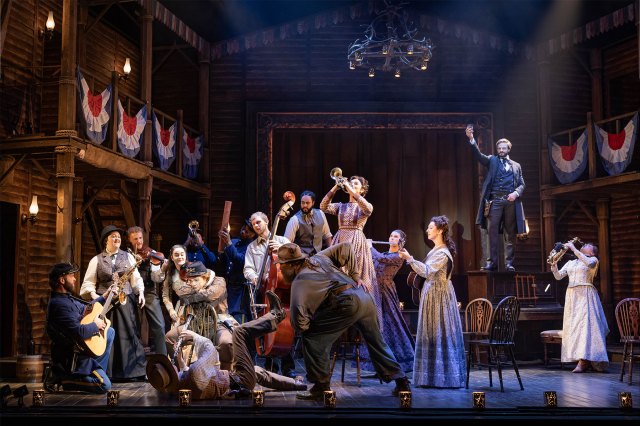Calamity Jane on tour starring Carrie Hope Fletcher – review
From “The Deadwood Stage” to a stage near you!

“You come in handy in a calamity, Jane.” The line is aimed at her character, but it’s equally true of Carrie Hope Fletcher, the principal redeeming feature of this unswervingly faithful adaptation of the classic film Calamity Jane. One moment sees her shake down a sheet, sending a cloud of dust into the air; she could be uncloaking the show itself. At times, it is so dusty you want to shield your face and cough. But instead of blasting it away, Nikolai Foster’s production prefers to swirl in it.
The South Dakota-set film, adapted here by Charles K Freeman, hails from 1953, so rolling down the plains comes a steady stampede of male chauvinism and outdated gender politics. Formidable Jane entertains the dwellers of Deadwood with tales of single-handedly vanquishing outlaws, but attracts equal attention for her refusal to dress and behave conventionally like the other women. This unabating pressure from the men to conform is exacerbated when she brings a famous actor’s assistant to perform for them. Unbeknownst to them, the assistant is posing as the actor, but her appearance and etiquette delight the men as “everything a woman ought to be”.
All the film’s conservative standards of beauty are retained, unchallenged, by the show. Jane’s single song of protest (“Men!”) is petulant in tone, rather than heartfelt and poignant, while her defences are called “hysterics” and met with lines like “that’s female thinking”. Although she eventually returns to her original clothes at the very end, we first see her put in elegant dresses and join the actor’s assistant in celebrating their domestic prowess in “A Woman’s Touch”. There’s no definitive, powerful moment where these values and attitudes are crushed or overturned.
Also imported from the film are Sammy Fain’s songs which work on screen but fizzle out on a large stage. Their drowsy singsong lilt works wonderfully, however, for “Black Hills of Dakota”, where Nick Winston choreographs ball dancers who quietly sway like wheat fields in a breeze. But there’s little to display introspection or test and showcase the musical skill of performers like Fletcher, apart from her final ballad, “Secret Love”, which blazes out of her but ends all too briefly.

The whole production is carried off like a holstered gun. Jane’s rivalry with Vinny Coyle’s Wild Bill Hickock consists of them knocking each other’s hats off, and their quick rally of insults in “I Can Do Without You” is overly playful. However, Fletcher’s charm and charisma sells Jane’s naivety. Her gawky strut is unconvincing enough to suggest she’s not as self-assured and self-sufficient as she wants everyone to believe. A stronger book and score would help her convey more sense of Jane’s embellished, deceptive tales mirroring a self-deception about her own inner feelings.
The show creates quaint effects redolent of classic old filmmaking. Pipe smoke becomes train smoke, and wheels are placed on an upright piano to convert it into a stagecoach, umbrellas fluttering behind it as it rolls along. Saxophone necks are pointed like rifles. Matthew Wright’s design uses a sandy palette, with the colour of his weathered costumes rinsed, as if sunbleached.
It all makes for a solidly efficient, tame mounting of a dated film. Wild West, this ain’t.



















